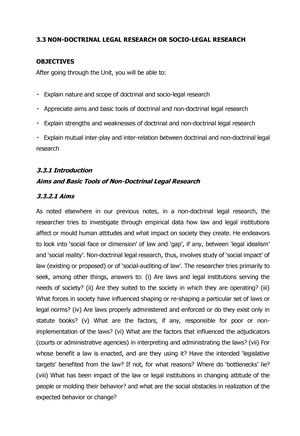Doctrinal research and non-doctrinal research are two different approaches to conducting research in the fields of law, sociology, and other disciplines. Doctrinal research involves the study of existing legal rules, principles, and theories, while non-doctrinal research involves the study of real-world situations and experiences.
Doctrinal research is often associated with legal scholarship, as it involves the analysis of legal doctrine and the application of legal principles to specific cases or problems. This type of research typically involves a close reading of legal texts and cases, and may involve the use of legal concepts and theories to interpret and analyze the law. Doctrinal research is often used to contribute to the development of legal doctrine and to inform legal policy and practice.
Non-doctrinal research, on the other hand, involves the study of real-world situations and experiences, often using qualitative or quantitative methods. This type of research may involve the collection and analysis of data from interviews, surveys, or other sources in order to understand how people behave and make decisions in real-world situations. Non-doctrinal research may be used to inform policy and practice, but is not limited to legal or policy-related issues.
One advantage of doctrinal research is that it is often based on a well-established body of knowledge and can be used to build upon existing legal principles and theories. Doctrinal research can also be highly influential in shaping legal doctrine and policy. However, this type of research may be limited in its ability to address practical, real-world problems, as it is based on existing legal doctrine rather than direct observations of real-world situations.
Non-doctrinal research, on the other hand, is often more directly concerned with practical problems and can be used to inform policy and practice. This type of research is not limited by existing legal doctrine, and can be used to study a wide range of issues, including social, economic, and political phenomena. However, non-doctrinal research may be less influential in shaping legal doctrine, as it is not based on a specific body of legal knowledge.
In conclusion, doctrinal and non-doctrinal research are two different approaches to conducting research that are used in a variety of fields, including law and sociology. Doctrinal research involves the study of existing legal doctrine and theories, while non-doctrinal research involves the study of real-world situations and experiences. Both types of research can be valuable in different contexts, and can be used to inform policy and practice in a variety of fields.






